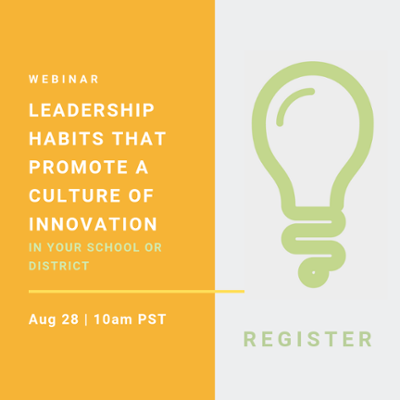Equity and personalized learning share quite a bit of common ground. They each require an ongoing commitment from all stakeholders. Both are built on the premise that each person’s needs are unique, and both recognize that no one set of tools and responses will support everyone. Peter Olson-Skog is drawing these connections concretely through his work as Superintendent at District 197 in West St. Paul. We recently interviewed him to learn more about how he connects equity and personalized learning in his district.
Peter Olson-Skog was named Superintendent for District 197 back in 2017. Prior to serving ISD 197, he was the Assistant Superintendent and Director for Teaching and Learning for Roseville Area Schools. Olson-Skog led several initiatives including a 1:1 technology roll-out, a focus on creating equitable schools, the development of a multi-tiered academic support system for students, and the implementation of an instructional coaching model for teachers.
Equity and PL have been a part of the picture for him for quite some time, predating his role at ISD 197. At Roseville Area Schools, Olson-Skog worked on a variety of projects rooted in equity, including training for teachers and administration to examine how they were both supported and evaluated, all through an equity lens. And though the language of personalized learning was not used at the time, the commitment to its values was alive and well. A major focus of his work both as Assistant Superintendent and Director of Teaching and Learning at Roseville was on data-driven and differentiated instruction, as well as centering student voice and choice.
When he started as Superintendent at ISD 197, the district was 6 months into implementing PL, but Olson-Skog recognized that getting buy-in was an ongoing effort. He consequently drew connections to the core values of PL for his school and all district stakeholders. He shared, “If you look at the core components of PL, digging into the data and understanding what students’ academic needs are: targeted instruction, following students’ interests - you already believe in those things.”
Today, Olson-Skog continues to draw connections between equity and personalized learning, with hopes of integrating a commitment to equity and PL in everything the district does. “Equity, for me, is getting each person what they need. It’s not giving each person the same thing. In personalized learning, everyone is not getting the same thing. They are getting something personalized based on their needs. So there is a lot of overlap in equity-based work. But equity work also tends to call out explicitly how those needs may vary based on race, culture, ethnicity, etc. And ultimately, when we say ‘student voice and choice’, that is about equity. In fact, personalizing the learning may mean being responsive to a student’s culture.”
Can personalized learning support educational equity?
When Olson-Skog began leading ISD 197 as Superintendent, the leadership team prioritized this commitment to equity across leadership and staff. During his first year, the board spent time working on equity-based training, and then expanded to school leadership in the second year. The district has since expanded to teaching staff in what is now his third year with the district.
The goal now? “We are digging deep and using our equity lens to focus on implementing culturally responsive pedagogy and practices district-wide.”
And the way that they know they have reached that goal mirrors their benchmarks and assessment measures for personalized learning. Part of measuring success for them in both equity and PL will focus on gathering feedback and reflections from students and teachers on the impact of these changes. They will also examine how successful they have been at integrating these practices into all of their work as a district. These frameworks are not seasonal initiatives, but rather foundational perspectives and commitments that ground all of their work. To reach that level of integration is the goal for both.
In measuring their success, critical questions emerge. Toward the goal of equity, the district will examine the systemic and institutional approaches that impact students and staff. The district will ask themselves questions like, “What equitable systems have we been building? What inequitable systems have we torn down?” In PL, they will ask, “Do students feel like we have created enough choice in their program to pursue their desires based on their college and career pursuits?”
Though the questions vary, they both reflect the desire to center, respond to, and support students’ needs and unique voices. That is the work of ISD 197.
Are you trying to bring a culture of innovation to your school or district? Join our webinar, where we'll explore the habits and traits of leaders who cultivate an innovative culture in their organization and share common tools and frameworks used by the most effective leaders across the country.





